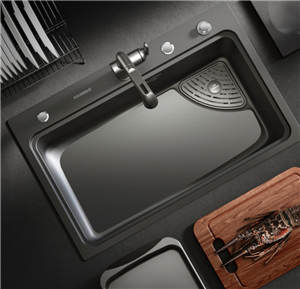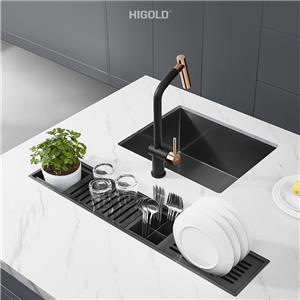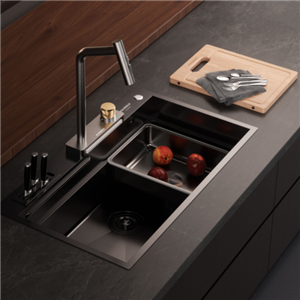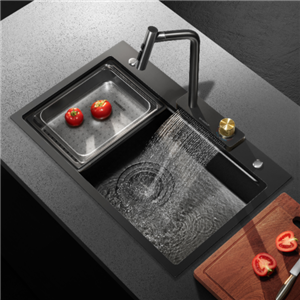Is a quartz kitchen sink better or a composite sink?
As an indispensable infrastructure in the kitchen, the kitchen sink is no longer just a simple tool. It not only carries the functions of daily use, but also needs to match the overall kitchen style, and has durability and easy cleaning. Among the many types of sinks, quartz kitchen sinks and composite sinks are two popular choices that have attracted much attention in recent years. Although the two sink materials seem similar, they actually have significant differences in composition, performance characteristics, and applicable scenarios.
So, which is better, a quartz kitchen sink or a composite sink? This article will conduct an in-depth analysis of material composition, durability, cleaning and maintenance, cost-effectiveness, and aesthetics, providing consumers with valuable references for making choices.
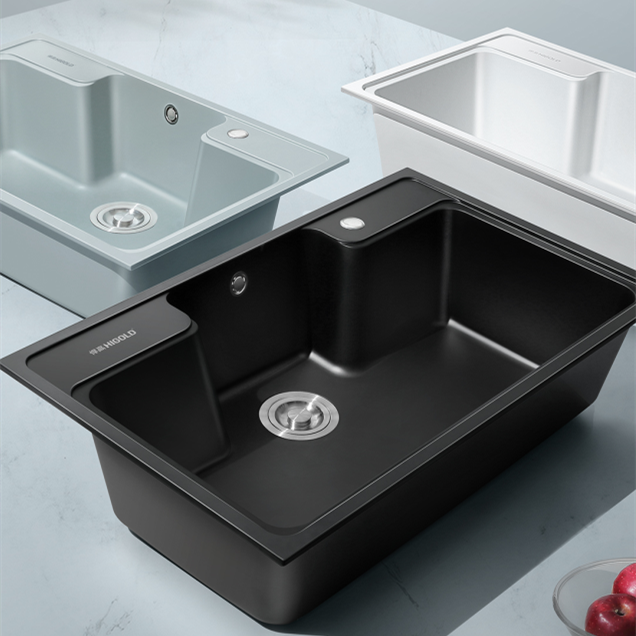
What is a quartz kitchen sink?
Quartz kitchen sinks are usually made of natural quartz sand and resin under high pressure. Quartz sand is a mineral with high hardness and strong wear resistance, usually accounting for more than 80% of the total material of quartz sinks. The rest is resin, adhesive, and some additives to enhance the anti-pollution and anti-permeability of the sink.
Quartz sinks have the following characteristics:
● Natural quartz composition: The addition of quartz sand makes the sink surface harder and more scratch-resistant.
● Strong and durable: The hardness of quartz sinks is close to or slightly higher than that of granite, and can resist wear and scratches in daily use.
● Diverse colors: Quartz sinks usually have rich colors and textures, which can meet the design needs of kitchens of different styles.
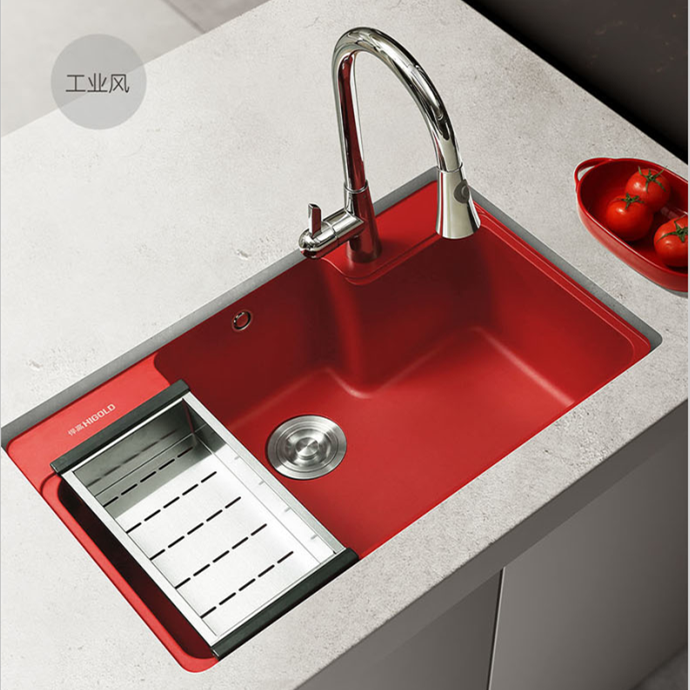
What is a composite kitchen sink?
Composite sinks are made of different synthetic materials. Common types include quartz composite sinks, stainless steel composite sinks, and ceramic composite sinks. The composition of composite sinks usually includes natural stone powder, resin, and other synthetic materials, which are pressed and formed by high temperature and high pressure processes.
The characteristics of composite sinks include:
● Diverse material composition: The material combination of composite sinks is more flexible, so the specific composition of different brands and products varies greatly, and may include quartz, granite, stainless steel and other materials.
● Good corrosion resistance: The surface of composite sinks usually has good corrosion resistance and can resist the adhesion of dirt such as scale and oil stains.
● Lightweight: Compared with quartz sinks, composite sinks are usually lighter in overall weight and easier to install and carry.
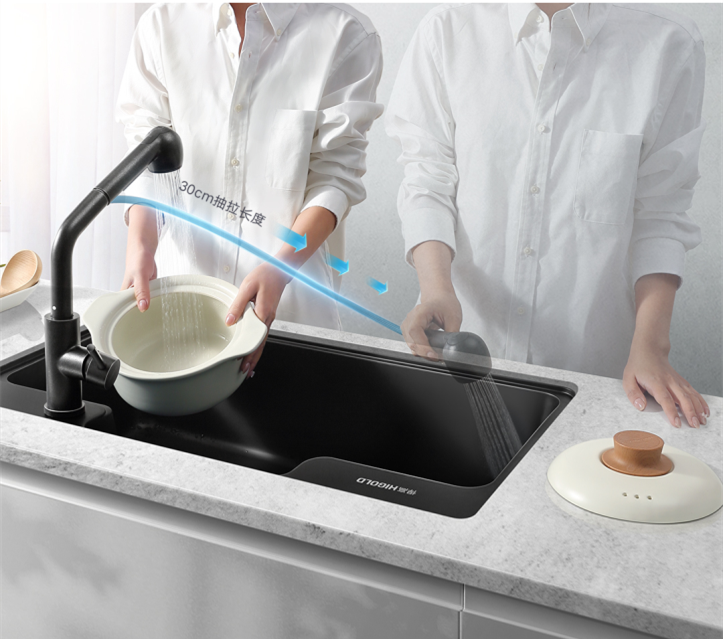
Performance comparison between quartz sinks and composite sinks
1. Durability
● Durability of quartz sinks: The biggest advantage of quartz sinks is their durability. Since the hardness of quartz is close to that of granite, it can resist scratches, collisions and other impacts in daily kitchen use. Even if hard objects such as knives and tableware fall into the sink, the surface of the quartz sink will not easily leave scratches. In addition, quartz sinks have strong pressure resistance and can withstand greater pressure without deformation or cracking.
● Durability of composite sinks: The durability of composite sinks depends more on the specific material combination. Quartz composite sinks are usually more durable, and their hardness and wear resistance are not inferior to quartz sinks. However, although stainless steel composite sinks have strong corrosion resistance, they are relatively weak in scratch resistance and are prone to scratches; ceramic composite sinks have better corrosion resistance, but they are more brittle and easy to break.
● Comprehensive evaluation: Quartz sinks are relatively more durable, especially in terms of scratch resistance and impact resistance. The durability of composite sinks depends on the material. Quartz composite sinks are more durable, but stainless steel composite sinks are slightly inferior in scratch resistance.
2. Cleaning and maintenance
● Cleaning and maintenance of quartz sinks: The surface of quartz sinks is usually smoother and has strong stain resistance. Oil stains, water stains and food residues are not easy to adhere to the surface, so it is relatively easy to clean. For daily cleaning, you can use a mild neutral detergent with a soft cloth to wipe, and avoid using hard objects such as steel wool to scratch the surface of the sink. In addition, quartz sinks have good antibacterial properties and can effectively reduce bacterial growth.
● Cleaning and maintenance of composite sinks: The cleaning and maintenance of composite sinks are relatively complicated compared to quartz sinks. Although the surface of most composite sinks also has a certain degree of stain resistance, due to different material combinations, the surface of composite sinks may be affected by different substances. For example, the cleaning method of quartz composite sink is similar to that of quartz sink, which is easy to clean and has strong stain resistance; however, the surface of stainless steel composite sink is easy to leave water stains and oil stains, which is relatively troublesome to clean. Although ceramic composite sink is smooth and easy to clean, its surface is easily scratched, so you need to be extra careful when cleaning.
● Comprehensive evaluation: Quartz sink is more convenient in cleaning and maintenance, especially suitable for busy families. Composite sinks have different cleaning difficulties and maintenance requirements depending on the material, and usually require extra attention and careful maintenance.
3. High temperature resistance and corrosion resistance
● High temperature resistance and corrosion resistance of quartz sink: Quartz sink has strong high temperature resistance and can withstand the high temperature environment in daily kitchen, including hot water, hot pot, etc. Quartz sink also has superior corrosion resistance and is usually not damaged by contact with acidic and alkaline substances or food residues.
● High temperature resistance and corrosion resistance of composite sink: Quartz composite sink has good high temperature resistance and corrosion resistance, and can resist the influence of general kitchen detergents and high temperature objects. However, stainless steel composite sinks may corrode or fade in certain strong acidic or alkaline environments. Ceramic composite sinks have strong corrosion resistance, but the brittleness of ceramic materials may cause cracks when the temperature changes drastically.
● Comprehensive evaluation: Quartz sinks have a relatively balanced performance in high temperature resistance and corrosion resistance, suitable for various kitchen environments. Quartz composite sinks among composite sinks perform better in this regard, but stainless steel composite sinks are slightly less corrosion resistant.
4. Appearance and design
● Appearance and design of quartz sinks: Quartz sinks are available in a variety of colors and textures, and can be customized according to the overall style of the kitchen, with both modern and simple styles, as well as more retro or natural appearances. The surface of quartz sinks is flat and smooth, comfortable to the touch, and gives a high-end and sturdy appearance.
● Appearance and design of composite sinks: The appearance design of composite sinks is diverse, with both imitation stone effects and metallic luster. Quartz composite sinks are closer to natural stone in appearance and tend to be more delicate in visual effects; stainless steel composite sinks give people a modern and simple feeling, suitable for industrial style kitchens; ceramic composite sinks present a retro and elegant style, suitable for traditional or country style kitchens.
● Comprehensive evaluation: The appearance design of quartz sinks is simple and elegant, and can meet the needs of a variety of kitchen styles. Composite sinks can provide different appearance effects according to different materials, suitable for diverse design needs.
5. Cost-effectiveness
● Cost-effectiveness of quartz sinks: The price of quartz sinks is relatively high, especially imported brands and high-end products. Nevertheless, considering its durability, appearance and cleaning convenience, quartz sinks have a high cost-effectiveness in long-term use and are suitable for consumers who pursue a high-quality kitchen experience.
● Cost-effectiveness of composite sinks: The price span of composite sinks is large. The price of quartz composite sinks is similar to that of quartz sinks, but the prices of stainless steel composite sinks and ceramic composite sinks are relatively low. For families with limited budgets, composite sinks, especially stainless steel composite sinks, may be a cost-effective choice.
● Overall evaluation: If you have a sufficient budget and pursue high-quality kitchen appliances, quartz sinks are undoubtedly a better choice. For consumers who pursue cost-effectiveness, composite sinks provide more price options and material combinations.
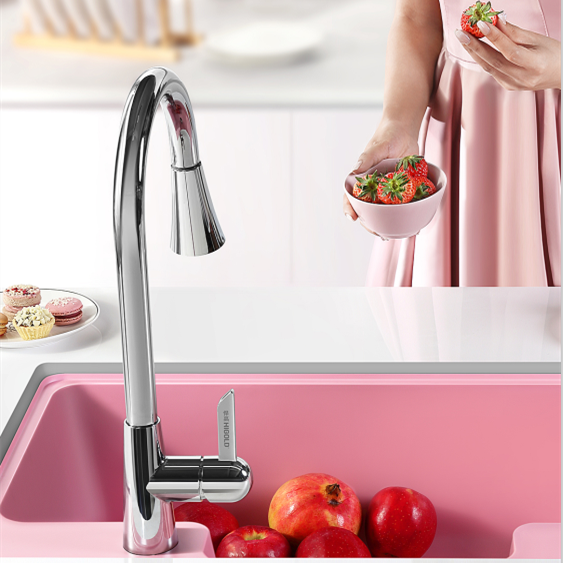
Trusted Supplier for Kitchen Faucets and Sinks
Higold Group Co., Ltd. is a trusted supplier of stainless steel Inox kitchen faucets and sinks. With over 500 patents, we are an industry leader in providing innovative solutions for both residential and commercial kitchens. Our factory-direct pricing ensures that you receive the best value, whether you are buying in bulk or placing a custom order. We offer fast delivery times, high-quality standards, and ongoing promotions to ensure customer satisfaction.

